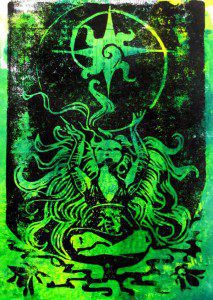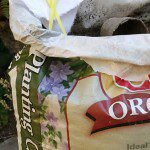There’s this ongoing argument in my druidic tradition about Earth Mothers and if they’re really REALLY really real, i.e. real in a Druidic Indo-European context. More to the point, we argue whether we should really put them first in our rituals. If you find three ADF druids, you’ll quickly discover seven different opinions on the way that ritual is done. In all our rituals, the Earth Mother is supposed to come first. This is the way our founder Issac Bonewits designed it. This is the way it is in our Core Order of Ritual. But, just because this is the way it is, doesn’t mean people can’t argue about it. As long as the sun shines and the moon waxes and wanes, people will argue. So, I’ve been on the lookout for Earth Mothers. Sometimes, I like to argue too. One of my favorites is from a very long time ago. She’s a Hittite earth goddess named Hannahannas.

The Hittites are old: like Bible old. Their empire was concurrent with the Assyrian Empire. They were forerunners of the Iron Age during the Bronze Age. Their chariot tech impressed the Egyptians and they sacked Babylon. These people were around almost 4,000 years ago. This means that when we talk about the Hittite Earth Mother, we are getting a glimpse of something very, very old.
I can hear you saying that the Greeks are old too, right? Yes, but they lasted longer. That means there was more evolution of their goddesses. One thing that you learn by studying history is that the gods change. They change because the climate changes, or the people worshiping change, or the people think new thoughts and their gods reflect that. By learning about the Hittite Earth Mother we get a glimpse into something that is very old and didn’t have time to change.
The Hittite Earth Mother was called Hannahannas. What we know of her is fragmentary at best, but we do have a story to consider. The tale goes that the Storm God’s favorite son is missing. His son is the God of Agriculture, Telepinu, who plows the earth and plants the seed. According to the ancient glyphs, He has had a giant temper tantrum and has wandered off. This is unfortunate, since he’s the god of growing things, and when he wanders off, people start getting hungry.
When this happens the Sun God steps up and offers a feast. He is the ally of the Storm God, who is clearly the boss in these parts. Unsurprisingly, that wonderful spread of high energy plasma and light isn’t very filling and the Storm God complains. So the Sun God sends out his eagle to search for the prodigal son, Telepinu. The eagle searches high and low, spying all with his clever eagle’s eye, but alas, no Telepinu.

The Storm God is clearly miffed at this point and does what he should have done in the first place. He goes to the Mother of All, Hannahannas. The Mother of All agrees to help, and like most mothers, probably gives him that look that makes adult children feel totally inept. At any rate, she sends out her sacred animal, the bee, to search for her grandchild Telepinu. Of course, the bee finds him. Then the bee begins to sting his hands and feet, and then wipes his eyes and his hands with beeswax.
After stinging her grandson into submission like an old woman beating a thief with a handbag, she gives her son, the King of Gods, some good advice to pay the bride-price for the Sea Gods daughter to wed Telepinu, because what is better to settle down a cranky young God of Agriculture than a lovely young Goddess? Grandma knows best.
Entertainingly, it’s not just the young folk who have been known to wander off in a fit of pique. There is a tale told of Hannahannas’ anger as well. We don’t know what happened to cause her to become enraged, but we do know that she wandered off too. Maybe she got tired of fixing everyone’s problems; maybe it just runs in the family.
While she’s gone sheep and cattle begin to die off, and mothers no longer take care of their children. This time, however, her anger is banished to the Dark Earth and she returns full of joy. I’m sure that her children were very grateful for the improvement of her mood. We aren’t told how this banishment of anger was achieved, but another method is to burn brushwood and let the vapors enter her.
So we know a couple of things from all of this. We know she is the mother of gods, connected to mothers, sheep, and cattle, and her sacred messenger is the bee, an insect that provides sweet honey and is connected with agriculture. The bee is also connected with Demeter, whose priestesses are called the Melissae, or the bees.
It seems likely that Hannahannas is a reflex, or has evolved from the earlier proto-Indo-European cow goddess. The Indo-European cow goddess has been reconstructed through linguistic detective work and appears to be a goddess of plenty and generosity. *Gwouinda is a created name that linguists think might have been the real name of the prehistorical cow goddess of the pastoralists that became the progenitors of many of the languages we speak today including English, French, Greek and Hindi. All of these languages have a common root through these crazy horse riding, cow grazing, wagon toting ancient peoples. So, by trying to understand the commonalities between them we understand our own beginnings, and we also find out that kick ass old grandmas have been around for a very, very long time.
I think I will keep putting her first in my rituals. I don’t know that she would wander off and need some refreshing vapors to put her right, but it can’t hurt.

Patheos Pagan on Facebook.

the Agora on Facebook
Dandelion Seeds is published on monthly on the first and third Wednesday. Subscribe via RSS or e-mail!
Please use the links to the right to keep on top of activities here on the Agora as well as across the entire Patheos Pagan channel.

















